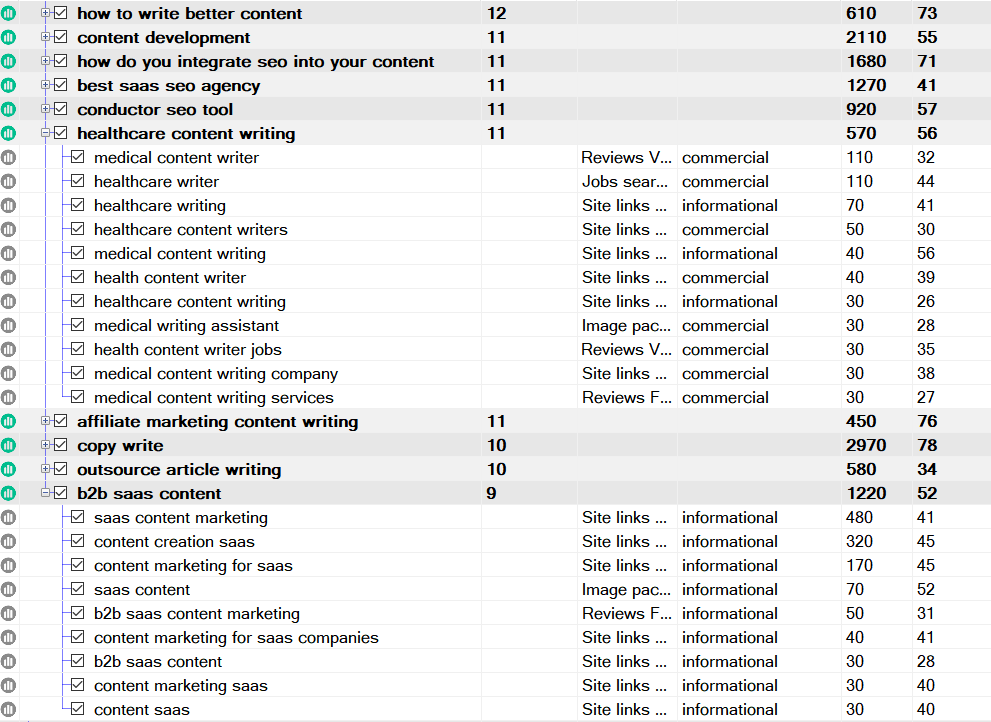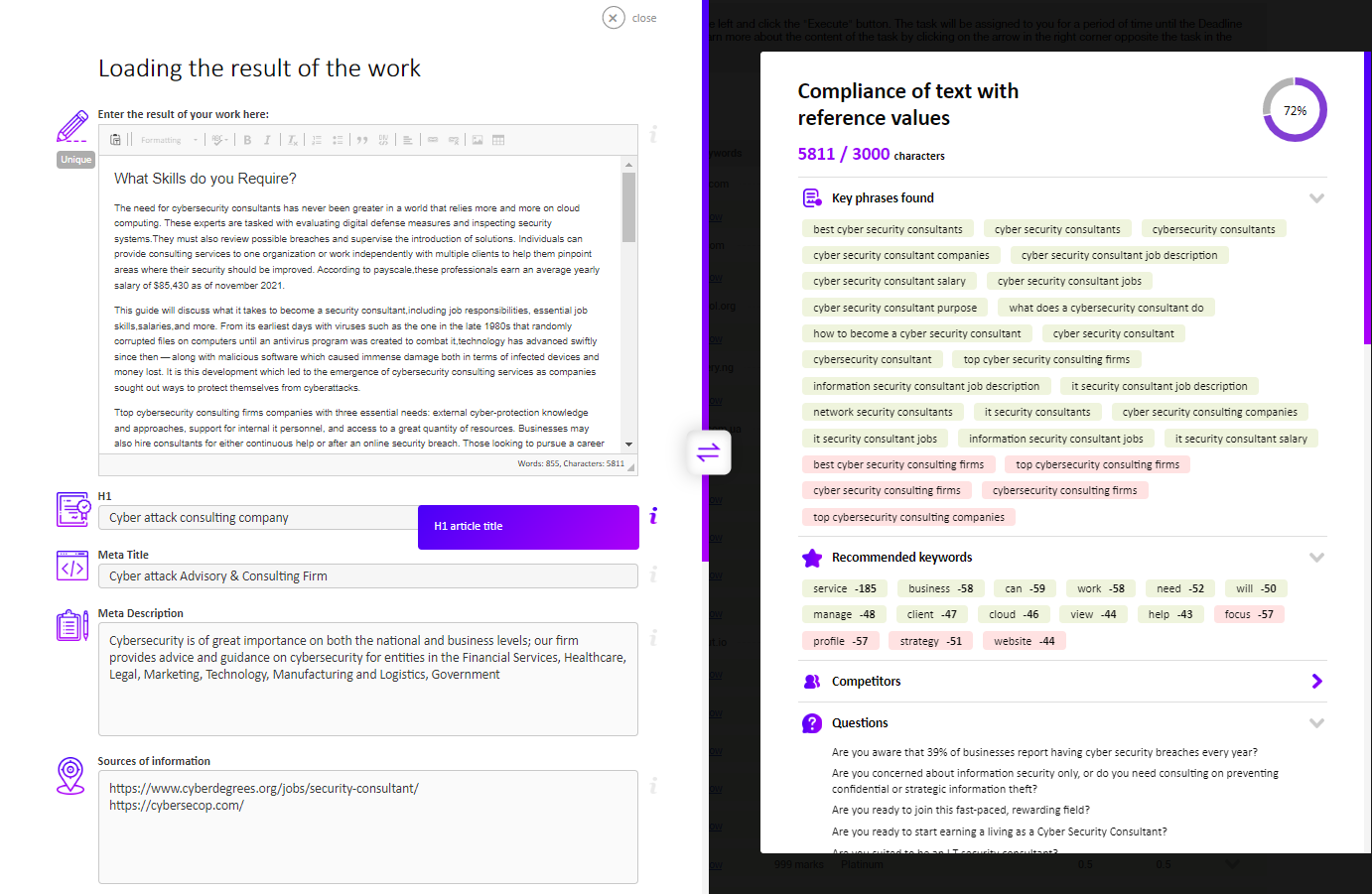But what is artificial intelligence? It can seem mysterious.
The development of AI has had a major impact on search. Searches are tailored to an individual based on their past activities, their device, their location, and many other factors. Search engines have a better understanding of what people are searching for. This technological change has significantly impacted search engine optimization. AI can create customized optimization techniques.
AI can greatly impact the way search engines rank websites by analyzing and understanding large amounts of data. This allows for more accurate and efficient processing of information, which can result in better website rankings.
|
According to a new report from Gartner, nearly 80% of marketers will adopt AI in the coming years. The report suggests that companies will adopt AI in the following areas: SEO content, SEO tools, and SEO strategy. |
SEO and AI offer a range of benefits, such as generating semantic keyword ideas, analyzing your competitors, and optimizing your content to build topical authority. AI can assist in keyword research by analyzing large amounts of data to identify patterns and trends, and by suggesting keywords and phrases that may be relevant to a website's content and analyzing performance metrics to track progress. The increased speed allows for more room for creativity - you will have less time spent on tedious tasks and more time to craft compelling content that will earn links and build trust with viewers.
SEO strategies should be tailored to the specific website that you are trying to rank for, as Google is making it more difficult to rank without a personalized approach.
Although it may seem complex, it is fairly straightforward to incorporate AI for SEO. It focuses on your AI application, which is why it is easy for any business to start using AI to significantly enhance their SEO and content plan in five steps.
Meet TextScout.io
A monitoring platform that is tracking millions of metrics to drive you toward stellar results
- Locate an AI-based program for search engine optimization.
To start embracing the future of SEO, choose an AI-powered application to create your content. It can make your life easier by building pages with your content and also make it easier to manage your content as it is being written.
This program can analyzing the SEO of different content topics, as well as existing pages, and providing actionable advice based on data when it comes to keyword targeting and optimization. It has the potential to predict how newly developed or re-optimized content will perform.
When selecting AI-driven software, take some time to consider your options and their respective costs. You want to choose a reliable and comprehensive platform with a track record of success. If you choose the first one, you find, it may not provide useful recommendations that could result in your content being on the second page of search results. Remember, only 25% of people look at what's on page two, so you don't want your material there!
- Decide on the subject matter of your work.
Once you have identified an AI-powered program, you can use it for SEO. AI is often used to produce new content, but it can also be used to revamp existing material.
If you're planning to create new content, start by researching relevant topics and keywords. Make sure you focus on aspects that are relevant to your industry, business, products, or services. For example, if you offer cooking classes, don't write about lawn care advice.

There are several tools that can make it easier to discover topics to write about, such as FAQs, keywords, and Answer the Public. Once you have determined your keywords and subjects, you can work with AI to optimize your SEO content.
- Analyze topics related to your blog.
The way you put keywords and topics into an AI system can differ. Generally, the app should give you a step-by-step guide to make the process simple. Depending on the provider, they can even do the whole submission process and give your group the results. All AI systems are different, so the way to put in keywords and subjects can vary.
Your AI platform may provide different types of data. For example, Textscout.io provides:
- Suggested length of the article
- Associated key terms
- Options for titles
- A summary of the semantic analysis
To make the most of this information, it is essential that everyone understands the various components. If there are any questions about the semantic analysis, don't hesitate to ask. By doing so, you can use the data to act.
- Review your AI SEO data.
The next step is to review the SEO data generated by your AI. It's a good idea to have the individuals in charge of marketing and SEO look at it. This way, they can verify that everything is correct and address any concerns. They can then pass along their suggestions to the content writers. Depending on the nature of your business, you may have a different plan in mind - if you have content creators from various departments, you may want to review the report with them first.

If you want to learn some basics about SEO, such as keywords and keyword stuffing, it's best to proactively protect that all your new content aligns with both brand guidelines and SEO regulations. To transition smoother, consider partnering with a third-party writing company that provides both SEO and content services, like Textscout.io. This arrangement means they will be familiar with every detail in your brief - from keyword advice to semantic analysis.
- Construct your SEO copy.
With the help of your writing staff, you can begin to produce content that is powered by AI and optimized for SEO. Regardless of the type of content your team or company writes, it is important to make sure that it:
- Complies with your brand's guidelines
- Incorporates the keywords you are targeting
- Follows the suggestions in your report
It would also be beneficial for someone to review the content before publishing. While it may be faster to produce and publish right away, it is not the best choice. You may end up sharing something with typos or grammar errors. Instead of taking that risk, make sure you take the time to thoroughly check your content - from sales copy to blog posts - before publishing them.
This will improve your rankings through SEO, as content is still the most important factor for Google's algorithm regarding natural language processing (NLP) and relevance to a user's query. High-quality and relevant content is more important now than ever before.
Despite the controversy surrounding Google's response to created content, we are seeing a growing use of applications based on GPT-3, and work on GPT-4 is already underway.
Analysis of the increase in traffic and rankings
Getting a handle on your website’s position in search engine results and the progress of its visitors is essential for SEO.
While Google Analytics may be useful here, it can take a lot of time to analyze the data. SEO vendor Textscout.io can forecast and alert you to changes in rankings so you can identify any problems quickly. You can also take corrective action.
AI can be seen as an addition to traditional SEO methods, it allows for more accurate and efficient processing of data, and can help identify and address issues that may be missed with traditional methods.
Forecast placements
It is often hard to determine which techniques have the greatest potential to raise your website's ranking due to all the variables at play. However, Artificial Intelligence (AI) can analyze all of these conditions and make predictions concerning the impact of each of them on ranking.
This information can be extraordinarily useful for fashioning an effective search engine optimization (SEO) strategy that will likely result in the highest rankings. Right now, TEXTSCOUT has this capability and more businesses are expected to build similar predictive tools shortly.
The core technology of the SEO provider can help agencies automate complex SEO tasks and improve accuracy in ranking strategies with its neural networks, which can learn from more than 100 factors.
Examining the algorithms used by search engines
One of the most challenging aspects of SEO is the unstable behavior of ranking positions. This can be quite disheartening when trying to track improvements. However, AI is the answer to this issue. AI technology can decrease the amount of flux in rankings and maintain a more consistent place in SERPs. If a ranking does get lower, AI such as SEO company Textscout.io, can speedily identify the source of the hurdle and point out the required steps to handle the problem.
Google’s algorithms evolve regularly, making it challenging to maintain up-to-date. This calls for systematic website auditing, which can be consumed in time. What’s more, any changes you make to your site that Google doesn’t approve of could end up in punishments or even blocking.
This could lead to a huge decrease in your visits and income. Although the existing audit technology enables you to stay abreast of the latest developments, soon AI will be capable of absolutely examining your website and detecting any warning signs that can result in a penalty. This data can then be utilized to modify your website before it is too late. Organizations in the forthcoming years will can steer clear of the expensive procedure for getting back to normal after a google sanction.
From now on, agencies will have more control over SERP rankings. AI-powered tools will help them analyze your website and find areas for improvement and priorities.
Keeping an eye on and examining other competitors
Staying one step ahead of the competition necessitates monitoring their SEO endeavors. While this can be a daunting challenge, as you have to vigilantly observe all the alterations they are affecting and deduce how they will affect your website, there are already several tools that can help you with this — albeit they need lots of manual labor. However, in the future, AI tools such as SEO vendors' core ai can take care of everything for you. It will detect any changes and evaluate how it influence your website.
How do you make your old SEO content powered with AI?
It's no shock that over half of all businesses have incorporated content marketing into their strategies, yet a lot of their websites have pages that barely draw any views. On top of that, those that do use content marketing are usually churning out new content each day, yet most of the materials do not generate any traffic, recognition, potential clients, or sales.
Your business can employ ai to revamp old content for SEO purposes. Applying AI, you can identify keywords and title tags that can help your content perform better in search results. To use SEO to maximize the potential of existing material, the same steps must be taken when creating new content. To find pages that are not performing up to par, create a list of them.
With SEO software and tools like Ahrefs that need a monthly subscription, you can find pages with poor performance.
After you have organized your list of webpages, have your AI tool analyze them. Carefully verify the feedback and advice provided by the system, and then go ahead and start to optimize those pages. To ensure your changes are preserved, it is wise to make a backup of the page and its current performance statistics prior to publishing your modifications.
What effect does AI search optimization have on marketing departments?
The ways in which content is created, improved, and put out into the world are evolving quickly. As time passes, using artificial intelligence to boost search optimization will alter the way marketing teams go about their work. As search algorithms become more sophisticated, so too does the nature of search engine optimization.
- Producing Content. Content developers are going to be increasingly creating content that meets specific identified search criteria and responds to AI-detected competitive possibilities.
- SEO Coordinators. SEO chiefs have provided various technical and content services yet going forward the occupational function will concentrate increasingly on investigation and tactics.
- Authenticity function. In 2027, 95% of enterprise marketers will have a."dedicated content authenticity function" to combat misinformation and ensure the quality of all content.
AI on search, has a major influence on how we enhance web pages for better rankings. In an ever-more competitive arena where top-level search placements are more essential than ever before, fully automated, organic-optimized publishing systems will become paramount.
Control SEO focus
Integrating Artificial Intelligence (AI) into SEO strategies is sure to have a significant impact on how businesses strategize and agencies serve them with obtaining better results.
Ai can be a great asset to those involved in SEO. However, there are three core principles to bear in mind and a point of emphasis on originality.
- Utilizing AI should be seen as an aid rather than a substitute;
- Content should be created with your audience in mind and not simply for the search engines and always strive for originality.
- As AI can create large amounts of content quickly, there is potential for it to devolve into an over-abundance of spammy material. This could lead to a website that lacks uniqueness or character.
Companies able to fully embrace AI will be able to remain ahead of the competition and obtain a greater SERP ranking. On top of this, agencies can use AI to automatically modify the aggressiveness or focus of a campaign, and client dashboards, such as the SEO AI Dashboard, can provide direct management over AI-centered approaches and search terms.
Seems evident that the world of SEO is exhibiting more daringness in implementing AI and machine learning. The subsequent years will be decisive in discovering how valuable these tools are in sustaining businesses to rank higher on SERPs.
Here is a table comparing AI writers and human writers in 9 points:
| Point of Comparison | AI Writer | Human Writer |
|---|---|---|
| Speed | AI writers can often write faster than humans, especially if they are programed to write for a specific purpose or in a specific style. | Human writers may take more time to write, especially if they are researching or trying to come up with new ideas. |
| Consistency | AI writers can be programed to produce consistent output, with little or no variation in style or tone. | Human writers may vary in their writing style and tone depending on their mood, the subject matter, or the audience they are writing for. |
| Empathy | AI writers may struggle to understand and convey the emotions and perspectives of their readers, as they do not have personal experiences or feelings of their own. | Human writers can draw on their own emotions and experiences to better understand and connect with their readers. |
| Adaptability | AI writers may be able to adapt to new styles or formats quickly, as they can be easily reprogrammed. | Human writers may take more time to adapt to new styles or formats, as they need to actively learn and practice new techniques. |
| Quality | The quality of AI writing can vary greatly depending on the programming and data it has been trained on. | Human writers may produce more varied and nuanced writing, as they have a wider range of life experiences and perspectives to draw from. |
| Grammar and spelling | AI writers can be programed to produce error-free writing, as they can be programed with a comprehensive understanding of grammar and spelling rules. | Human writers may make mistakes in their writing, especially if they are writing quickly or under pressure. |
| Creativity | AI writers may struggle to produce truly creative writing, as they are limited by the data and patterns they have been trained on. | Human writers have the potential to be highly creative, as they can think and write in ways that are not restricted by existing patterns. |
| Research | AI writers may be able to quickly gather and synthesize information from a wide range of sources, as they can be programed to do so. | Human writers may take more time to research and gather information, but they may also be able to bring a deeper understanding and interpretation to the information they gather. |
| Feedback and editing | AI writers may not be able to fully understand or incorporate feedback and editing, as they do not have the same level of understanding and interpretation as humans. | Human writers can understand and incorporate feedback and editing more effectively, as they have a deeper understanding of language and meaning. |
It's worth noting that these are generalizations and there will be individual variations among both AI writers and human writers.
What risks?
The dangers of utilizing AI in SEO could lead to being disallowed from Google if you fail to come up with something new. Utilize AI as an aid for producing improved content, not as a substitution for human inventiveness. Remember your individuality and do your best to eschew aping your opponents.




 Leave a comment
Leave a comment